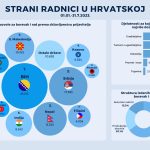ZAGREB, March 22, 2019 – After a three-hour session of the Croatian parliament’s Home Affairs and National Security Committee, which discussed and adopted security services’ reports for 2018, Security-Intelligence Agency (SOA) head Daniel Markić told reporters that he believed that he would clarify, together with the leadership of Bosnia and Herzegovina’s security-intelligence agency OSA, accusations that Croatian agents had recruited and armed radical Islamists in Bosnia and Herzegovina.
Markić resolutely dismissed the accusations by Bosnia and Herzegovina Security Minister Dragan Mektić that SOA had recruited members of the Salafi movement to plant weapons in Muslim places of worship so that they could be discovered by police following tip-offs as evidence of Croatian President Kolinda Grabar-Kitarović’s earlier claims about thousands of radical Islamists in Bosnia and Herzegovina.
“It is interesting, even shocking what is going on in Bosnia and Herzegovina…. So far, we have cooperated in the fight against terrorism with OSA, and SOA has only one interlocutor in Bosnia and Herzegovina – OSA… I hope we will clarify the matter,” Markić told reporters.
He dismissed accusations that Croatian services had recruited and armed radical Islamists in Bosnia and Herzegovina. “That definitely did not happen and I dismiss the accusations. SOA has naturally talked with those people and will continue to talk with them for the sake of our own and our neighbours’ security, and the security of the EU and NATO,” he said.
“We pointed to a person that was suspicious and said what that person was doing. We talked with H.C., we know who it is, and we informed the partner agency in Bosnia and Herzegovina about it.
“We received a clear answer from OSA but I leave it to them to comment,” he said, declining to reveal OSA’s answer and noting that he was willing to declassify SOA’s findings if necessary.
He also dismissed accusations that SOA had sought cooperation from a number of persons in Croatia, threatening to deport them to Bosnia and Herzegovina if they refused.
Markić said that he would not meet with Mektić, who is in Zagreb for medical treatment. “We do not cooperate with Mr Mektić, he does not seem to have control over the intelligence community in Bosnia and Herzegovina,” he said, adding that he was worried by the return of people who had fought on ISIL’s side to Bosnia and Herzegovina.
SOA estimates that around 1,000 Bosnia and Herzegovina nationals have fought on the side of ISIL. “Maybe 35% of them have returned, 30% have possibly been killed but we will check everything with our partners,” said Markić.
Speaking of a recent terror attack on New Zealand, Markić said that there was no need to fear far-right radicalism in Croatia. “I don’t believe that scene is active here,” he said.
Regarding information that the killer from New Zealand had stayed in Croatia, Markić said that Croatian services cooperated with New Zealand’s services and were exchanging information. “We do not, however, have any information that could indicate that he was involved in any negative activities in Croatia or that he had contacts that could have indicated what he would do,” said Markić.
He added that SOA would publish by the end of the month a report with an overview of its activities and assessments for the future.
The chair of the Home Affairs and National Security Committee, Social Democrat Ranko Ostojić, said that all Committee members asked SOA officials very concrete questions to which they were given concrete answers and that they were satisfied with the information obtained.
As for the intelligence problem in Bosnia and Herzegovina, Ostojić said that he would ask OSA for its position on the matter. “Markić was very specific and said that he still had not received any answer from the partner service, so I cannot comment for now…. Those who fail to provide arguments (for their claims) have a serious problem,” he said, adding that the accusations coming from Bosnia and Herzegovina had been made for daily political purposes.
The government of Bosnia and Herzegovina on Thursday did not discuss, contrary to earlier announcements, the alleged espionage scandal and accusations that Croatian intelligence agents had recruited members of the Salafi movement in the country to plant weapons in some of the Muslim places of worship in Zenica-Doboj Canton.
Prime Minister Denis Zvizdić did not offer an explanation as to why a report on the matter had not been submitted by Security Minister Mektić.
A week ago, Mektić accused his deputy Mijo Krešić, the Croatian consul in Tuzla, Ivan Bandić, and Serb entity RTRS public broadcaster reporter Mato Đaković of bribing members of the Salafi movement to hide weapons in some places of worship so that they could be later found by the country’s police agencies and serve as evidence that radicals were arming themselves and threatening the country’s security.
Zvizdić spoke of the importance of the return and prosecution of Bosnia and Herzegovina nationals currently fighting or imprisoned in Syria. “Considering unfair speculation about thousands of radical fighters in Bosnia and Herzegovina, I have to say that in the last three years there were no departures of Bosnia and Herzegovina nationals to battlefields abroad. There are currently 102 Bosnia and Herzegovina nationals in Syria, of whom 54 are men and 48 are women,” he said.
“If we have to, we will return them and prosecute them. We are controlling the situation and dismiss speculation that Bosnia and Herzegovina is a terrorist hotbed,” said Zvizdić.
After a session of the Intelligence-Security Committee (OSO) today, Zvizdić’s deputy Vjekoslav Bevanda called for supervision of OSA’s work and for putting an end to media affairs such as the one on the alleged recruitment of radical Islamists by SOA.
Bevanda said in a statement that acts by individual members of the government were unacceptable, an evident allusion to Mektić.
He also said that recurrent intelligence affairs were worrying and that they were mostly directed against neighbouring countries. “I don’t believe that it will lead to regional cooperation or good foreign or internal relations,” Bevanda said after the session of OSO, a government body comprising the most senior government officials, which was also attended by OSA head Osman Mehmedagić but not by Mektić.
More news about relations between Croatia and Bosnia and Herzegovina can be found in the Politics section.







